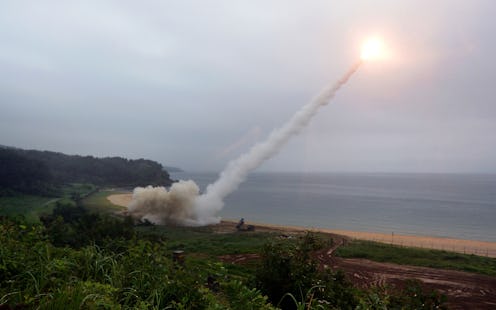
At the end of July, the simmering tension between North Korea and the United States took on heightened urgency after observers noted that the latest North Korean missile could possibly reach the West Coast. The "rebel state" carried out a test on an intercontinental ballistic missile (ICBM), which experts believe could reach coastal cities in the west of the United States, such as San Francisco and California. This particular experiment was the second intercontinental missile test conducted in less than a month.
However, experts believe that it is not clear yet whether the country's leader, Kim Jong-un, has amassed enough technological expertise to hit an actual target. The recent tests, taken with North Korean state media claiming that its military is considering an attack on the American Pacific territory of Guam, have caused paranoia to loom large in the United States. It seems that while fear may not be the most productive response at this point, it certainly is a natural reaction among Americans.
According to South Korean, American, and Japanese experts, the North Korean missile presence in the air revealed significant details about its possible range. The missile reportedly remained in the air for 47 minutes and shot a high and sharp ascension of 2,300 miles into the sky, until it ultimately landed in the sea water by Hokkaido.
Although the trajectory of the missile was predominantly vertical and steep, experts believe that the missile could hit the West Coast if North Korea flattened out its pathway. Kim Dong-Yub, an expert working at the Institute for Far Eastern Studies at Kyungnam University in Seoul, was quoted in the New York Times saying that the missile could "easily" hit the West Coast of the United States in a range of 5,600 to 6,200 miles.
To put that into perspective, California is some 5,626 miles from North Korea. The country, Kim added, "leaves no doubt that its missile has a range that covers most of the United States." The most potentially vulnerable sites in the United States would include Hawaii, which hosts the American Pacific Command, and San Diego, which is home to the Pacific Fleet.
Experts, however, have cautioned against baseless fear, including paying too much attention to Trump's potentially endangering remarks issued on Tuesday. Trump warned North Korea of "fire and fury like the world has never seen" in an unscripted comment that has sparked backlash from other lawmakers, but ultimately, experts believe that it is unlikely that North Korea will conduct an attack on the United States. Those of you on the West Coast can rest easy, at least for now.